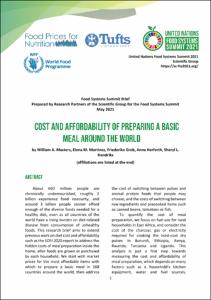Cost and Affordability of Preparing a Basic Meal around the WorldFood Systems Summit Brief Prepared by Research Partners of the Scientific Group for the Food Systems Summit May 2021

Cost and Affordability of Preparing a Basic Meal around the World
Food Systems Summit Brief Prepared by Research Partners of the Scientific Group for the Food Systems Summit May 2021

| dc.contributor.author | Masters, William A. | |
| dc.contributor.author | Martinez, Elena M. | |
| dc.contributor.author | Greb, Friederike | |
| dc.contributor.author | Herforth, Anna | |
| dc.contributor.author | Hendriks, Sheryl L. | |
| dc.date.accessioned | 2021-07-07T13:18:37Z | |
| dc.date.available | 2021-07-07T13:18:37Z | |
| dc.date.issued | 05.2021 | |
| dc.identifier.uri | https://hdl.handle.net/20.500.11811/9201 | |
| dc.description.abstract | About 690 million people are chronically undernourished, roughly 2 billion experience food insecurity, and around 3 billion people cannot afford enough of the diverse foods needed for a healthy diet, even as all countries of the world have a rising burden on diet-related disease from consumption of unhealthy foods. This research brief aims to extend previous work on diet cost and affordability such as the SOFI 2020 report to address the hidden costs of meal preparation inside the home, after foods are grown or purchased by each household. We start with market prices for the most affordable items with which to prepare a basic meal in 168 countries around the world, then address the cost of switching between pulses and animal protein foods that people may choose, and the costs of switching between raw ingredients and precooked items such as canned beans, tomatoes or fish. To quantify the cost of meal preparation, we focus on fuel use for rural households in East Africa, and consider the cost of the charcoal, gas or electricity required for cooking the least-cost dry pulses in Burundi, Ethiopia, Kenya, Rwanda, Tanzania and Uganda. This analysis is just a first step towards measuring the cost and affordability of meal preparation, which depends on many factors such as a household’s kitchen equipment, water and fuel sources, distance to markets, demographic composition and cost of time. Our work on the hidden costs of meal preparation goes beyond market prices of food itself to consider other barriers to consumption of a healthy diet by each household, and complements true cost accounting that takes account of environmental or social externalities from production and distribution of food, as well as the health externalities involved in food consumption. The data shown here reveal that even just the raw ingredients for a basic plate are often unaffordable for the poorest, and the added cost of time and fuel can make such meals prohibitively expensive. Results suggest two main avenues for policy action. First, governments now can and should use the information on the least costly way to meet dietary standards to inform poverty lines and provide targeted assistance to ensure that citizens can acquire safe and nutritious items in sufficient quantities for an active and healthy life, using local- appropriate safety nets. Second, food policies should recognize the hidden costs of meal preparation that often put healthier, more sustainable diets out of reach. Overcoming the hidden barriers to preparation of healthy meals will require support for helpful forms of food processing such as cooking and canning beans, fish, tomatoes or other foods that preserve or even enhance nutritional values, while simultaneously taking action to limit potentially forms of ultra- processing such as excessive levels of added sugar, salt or trans fat and other factors associated with diet-related disease. Actions that support helpful forms of food processing while limiting harmful processing could help households improve diet quality, while also reducing the time burden, respiratory diseases and climate- change consequences of using wood or charcoal for cooking, as well as other inefficient and inequitable aspects of meal preparation. Taken together, food-based safety nets and improvements in the food environment can make healthy diets affordable for all people at all times, to help every country reach global development goals. | en |
| dc.format.extent | 23 | |
| dc.language.iso | eng | |
| dc.rights | In Copyright | |
| dc.rights.uri | http://rightsstatements.org/vocab/InC/1.0/ | |
| dc.subject | Food systems | |
| dc.subject | Meals | |
| dc.subject | Cost | |
| dc.subject | Affordability | |
| dc.subject.ddc | 610 Medizin, Gesundheit | |
| dc.title | Cost and Affordability of Preparing a Basic Meal around the World | |
| dc.title.alternative | Food Systems Summit Brief Prepared by Research Partners of the Scientific Group for the Food Systems Summit May 2021 | |
| dc.type | Arbeitspapier | |
| dc.identifier.doi | https://doi.org/10.48565/scfss2021-td53 | |
| dc.publisher.name | Center for Development Research (ZEF) in cooperation with the Scientific Group for the UN Food System Summit 2021 | |
| dc.publisher.location | Bonn | |
| dc.rights.accessRights | openAccess | |
| dc.relation.url | https://sc-fss2021.org/wp-content/uploads/2021/06/FSS_Brief_Cost_of_Basic_Meals.pdf | |
| ulbbn.pubtype | Zweitveröffentlichung | |
| dc.version | updatedVersion |
Files in this item
This item appears in the following Collection(s)
-
FSS Briefs by Partners of Scientific Group (41)
"Food Systems Summit Briefs" are invited papers by the Scientific Group in support of the Summit agenda setting.




